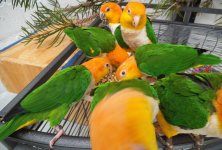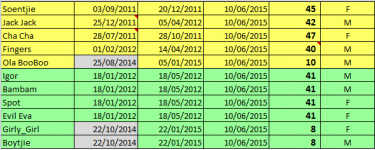littlewing
New member
My little guy is about to turn 2 years old next month. He is a WBC and Ive had him for 1 1/2 years. This past month he's started doing this thing where he bristles his head feathers and his eyes pin. He looks crazed and will attack and bite us, drawing blood! It's as if he's in some kind of state and he doesn't even hear us or know who we are. Then after 5 or 10 min, he's back to his normal loving self.
Tonight was the first night he's done this to me (I'm his mommy). But apparently, he has been exhibiting this kind of behavior in the morning for the past few weeks when his papa uncovers the cage. He will come out of the cage, and bob his head with his feathers and eyes looking all psychotic, and will lunge bite really hard if an attempt to pick him up is made.
I recognize the sort of 'attack mode' he goes into, because he does that when I am wearing gloves for cleaning. He wants to attack them. But I can always take them off my hands and am able to pick him right up. He also does it with the broom when I sweep the floor. But this seems a little more severe. There is no talking him out of it. He is just out of his mind.
I am wondering if it is just springtime birdy hormones or something. I am so upset nursing my 2 deep puncture wounds that my sweet little baby gave me
I don't want to become afraid of him. He has been so fun to play with and cuddle with.
Any advice will be greatly appreciated!
Tonight was the first night he's done this to me (I'm his mommy). But apparently, he has been exhibiting this kind of behavior in the morning for the past few weeks when his papa uncovers the cage. He will come out of the cage, and bob his head with his feathers and eyes looking all psychotic, and will lunge bite really hard if an attempt to pick him up is made.
I recognize the sort of 'attack mode' he goes into, because he does that when I am wearing gloves for cleaning. He wants to attack them. But I can always take them off my hands and am able to pick him right up. He also does it with the broom when I sweep the floor. But this seems a little more severe. There is no talking him out of it. He is just out of his mind.
I am wondering if it is just springtime birdy hormones or something. I am so upset nursing my 2 deep puncture wounds that my sweet little baby gave me
I don't want to become afraid of him. He has been so fun to play with and cuddle with.
Any advice will be greatly appreciated!

